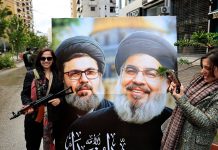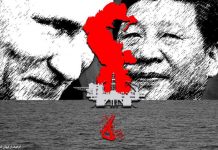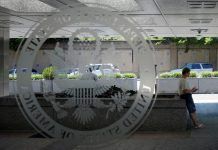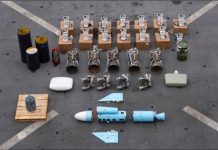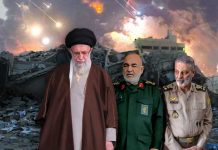The detention of Italian journalist Cecilia Sala by the Islamic Republic on December 19 is an act of hostage taking, and nothing to do with press freedom, said Richard Ratcliffe, husband of the British dual national Nazanin Zaghari-Ratcliffe — who was arbitrarily imprisoned in Iran for six years on charges of plotting to topple the Iranian government.
Sala, who is the host for a popular foreign affairs podcast in Italy, was arrested by Iranian officials shortly after publishing a podcast about Zeynab Mousavi, a female comedienne who was detained in 2023 by Iran authorities and placed in solitary confinement for speaking out against the theocracy’s compulsory hijab in her videos.
Sala is one of at least six foreign nationals currently being detained in Iran.
“I was really saddened that here was someone new, young and hopeful, and now in Ward 2A of Evin prison, at the center of the hostage machine,” Zaghari-Ratcliffe said in a Dec. 31 interview with Kayhan Life. “The Islamic Republic will continue to take hostages because it works. There will not be an end to it until there is a cost. For Cecilia, I just hope she is okay, and that people keep saying her name.”
“My first instinct was that it was hostage taking, and she had been profiled by Iran,” Ratcliffe told Kayhan Life. “They used to take well-connected older men, but shifted their target when they realized that attractive young women get more media coverage and outrage.”
EXCLUSIVE : Detained Italian Journalist Is Islamic Republic’s Latest Hostage
“I was really deflated to see her arrest being covered as an issue of freedom of journalism,” he added. “Iran did not arrest Cecilia because they didn’t like what she was doing, they arrested her because they liked her passport.”
Zaghari-Ratcliffe was freed in 2022 in a deal that was facilitated by Britain’s payment of a $522 million debt which it owed Iran. The sum was paid on the same day that Zaghari-Ratcliffe was released, after years of high-profile advocacy and campaigning by her husband.
Sala’s detention and arrest have been condemned by major international organizations including the Washington-based National Press Club.
“The National Press Club demands the immediate release of Cecilia Sala, a fearless journalist unjustly imprisoned in Tehran,” Emily Wilkins, president of the National Press Club, said in a Dec. 28 statement. “Her detention is an affront to press freedom and a violation of international norms. Journalism is not a crime.”
“It is appalling that Sala has been subjected to solitary confinement, a cruel and punitive measure condemned by the United Nations Mandala Rules, which prohibit such treatment for more than 15 consecutive days,” Wilkins said.
According to an exclusive Kayhan Life report, Sala’s arrest is linked to the detention of Iranian businessman Mohammad Abedini in Milan on Dec. 16. He was detained at the request of the US government on charges of supplying electronic parts for drones to the Islamic Revolution Guard Corps (IRGC), resulting in the deaths of three US soldiers. A US State Department spokesperson said Sala was being used as “political leverage,” according to the Italian newspaper La Repubblica.
Italy’s Foreign Minister Antonio Tajani declined on Dec. 30 to confirm whether the Sala case might be linked to Abedini’s detention. Iran’s government confirmed Sala’s arrest on Dec. 30 for “violating the laws of the Islamic Republic,” Iran’s official IRNA news agency reported.
Human rights experts and Western states have accused the Iranian regime of using foreign nationals as political bargaining chips since the 1979 revolution in Iran. This form of state policy is often referred to as hostage diplomacy, which involves states taking dual nationals, Western nationals and Iranian citizens residing in Europe, the United States or Australia, as foreign hostages for political and financial leverage.
The earliest incident of hostage taking is cited by some experts as the 1979 siege of the US embassy in Tehran, in which 53 US diplomats and citizens were held hostage inside the embassy by armed Iranian university students who supported the revolution, for more than one year. The siege was widely perceived in Iran as an act against the US and its influence in the Islamic Republic, including its attempts to undermine the revolution.
There are at least six foreign nationals currently detained in Iran:
- Sala, an Italian national and journalist, who has been detained for more than two weeks
- Mehran Raoof, a British-Iranian labor activist who initially chose not to publicize his arrest in 2020, but has since made his detention public. Raoof has spent more than 1,500 days in prison on national security charges
- Nahid Taghavi, a German-Iranian woman and rights activist detained in 2020, who has spent more than 1,500 days in jail also on national security charges
- Abdolrasoul Dorri-Esfahani, an Iranian-Canadian accountant and an advisor to the Central Bank of the Islamic Republic of Iran, who is accused of spying for the UK and the US, has spent more than 3,000 days in prison following his arrest in 2016
- Ahmad Reza Djalali, an Iranian-Swedish lecturer and researcher, detained since 2016, who has spent more than 3,100 days in prison after being sentenced to death for espionage
- Nazak Afshar, a French-Iranian woman and former member of staff at the French embassy in Tehran, who was convicted in 2009 of spying and of acting against Iran’s national security. Afshar spent 3,215 days in detention and was released for urgent medical treatment in France that same year. The Iranian government sentenced Afshar to a six-year prison term in 2016, which Afshar appealed. She has chosen not to publicize her case.
The exact number of foreign nationals held in Iran is unknown: some individuals decide not to make their cases public as a strategy to secure their release. However, the effectiveness of this tactic has been contested by former detainees and their families.
“Governments have different interests from families and often try to suppress them. Sunlight keeps you safe, however elegantly the government experts argue otherwise,” Ratcliffe said. “The first step is always to get access. If that is being denied, then Italy needs to set clear consequences and clear red lines to keep Cecilia safe. The Foreign Minister issuing pious statements announcing Cecilia is fine, when this is based on Iranian assurances only is the wrong thing. It sends a signal that her abuse is tolerable to the Italian state.”
ANALYSIS: The Hostage Trade Is Central to Iran’s Foreign Policy
European attempts to stop Iran’s hostage diplomacy were criticized by Clément Therme, an associate researcher at the Paris-based School for Advanced Studies in the Social Sciences (EHESS) in a December report about European nationals detained in Iran, for the Institut français des relations internationales (IFRI) think tank in Paris.
“European efforts to deter this practice, such as targeted sanctions against Iranian officials involved, have failed to achieve significant progress since the 2000s. This phenomenon highlights the tensions between Tehran’s claims of national sovereignty and international norms on human rights and diplomacy,” Therme said. “Hostage diplomacy is widely criticized by human rights organizations and Western governments. In the case of European hostages, this practice exacerbates tensions between Iran and the countries involved, complicating negotiations. From Europe’s perspective, the Islamic Republic will continue to be seen as an unreliable diplomatic actor as long as this practice persists.”
The United Nations Human Rights Council addressed the practice in a Dec. 16 call for submissions titled: “Hostage-Taking as Torture: Legal frameworks, supporting victims and families, and strengthening global responses.” The call was launched to back up the latest report by Dr. Alice Jill Edwards, the UN special rapporteur on torture. Edwards, who is Australian, is the first woman UN special rapporteur on torture.
“States have a legal obligation to prevent torture. I told the UN team when we met that I hoped they could translate what that obligation means in terms of committing to prevent hostage taking, rather than just pretending it away,” Ratcliffe said.
The report “aims to clarify the legal frameworks, highlight emerging trends, and emphasize state responsibilities towards victims and their families,” according to the call’s web page.
The Australian senate’s Standing Committee on Foreign Affairs, Defence and Trade produced a report in November about how to stop the wrongful detention of Australians abroad, marking the first time the Australian government directly acknowledged that it needed a clear strategy to deal with the threat. Among the recommendations in the report are the requirements to produce a clear definition of wrongful detention, to create a “Special Envoy for Wrongfully Detained Australians,” and to sanction senior officials responsible for wrongful detentions.
“The main problem remains hostage denialism. Western governments still pretend the problem doesn’t exist. They still refuse to call it hostage taking, they still downplay and deny the abuses when their citizens are taken,” Ratcliffe said. “Hostage diplomacy is a form of serious organized crime, and a successful one that Iran is using to subvert many other forms of human rights accountability – as seems again in this case. The pretense that it is not really happening is foundational for Iran’s impunity, and for its continuing growth. Until there are costs for hostage taking – alongside the transactions that get people home, it will continue to spread.”

